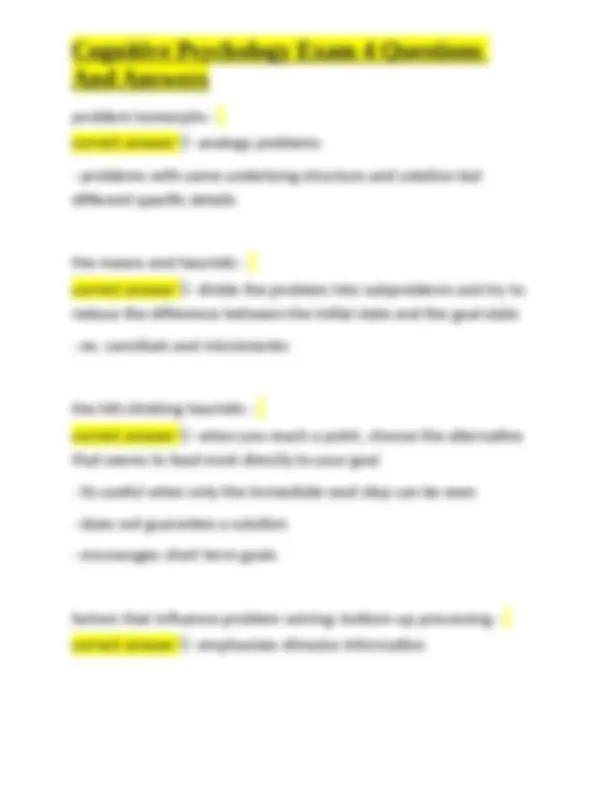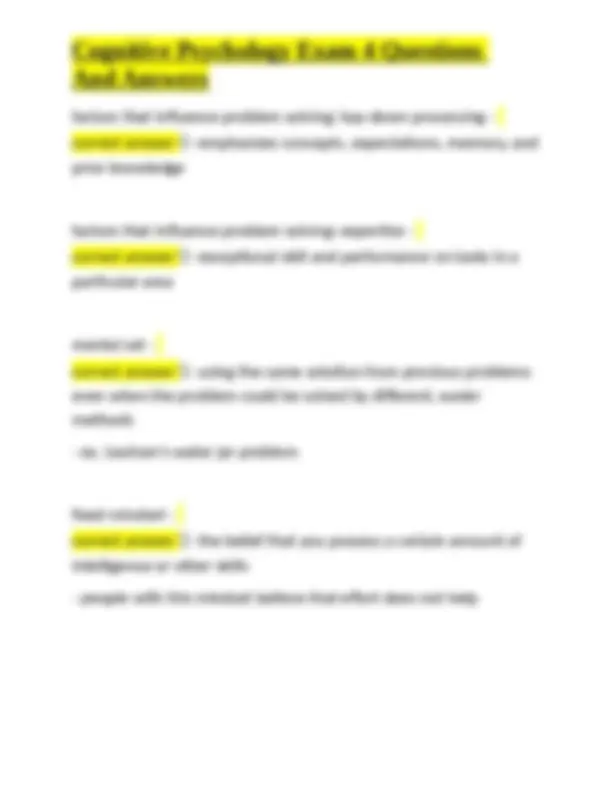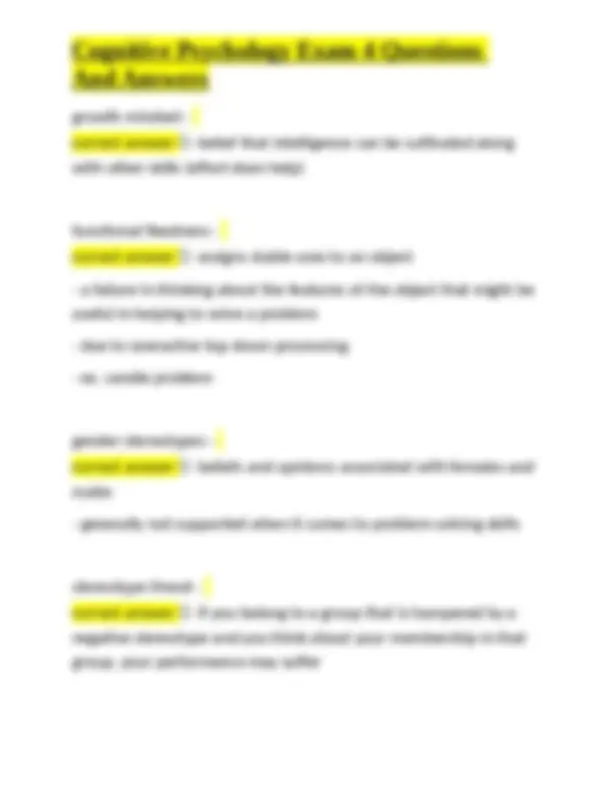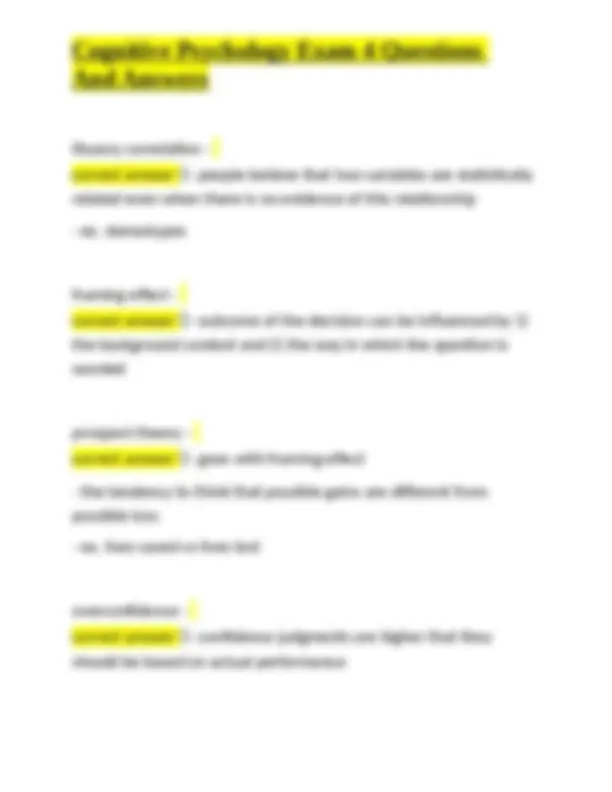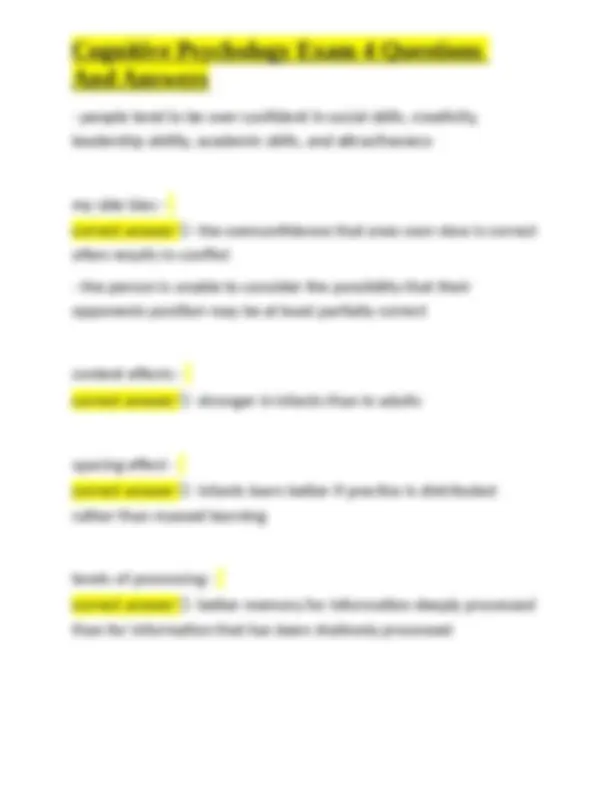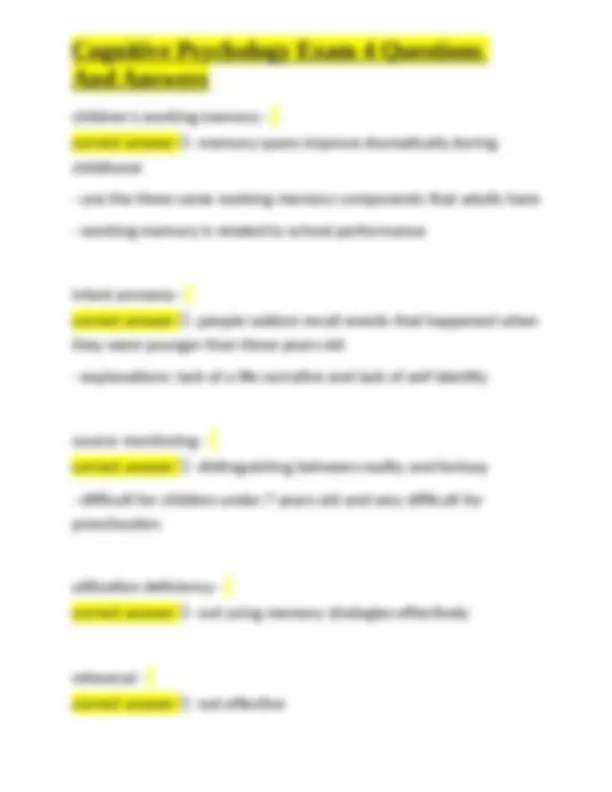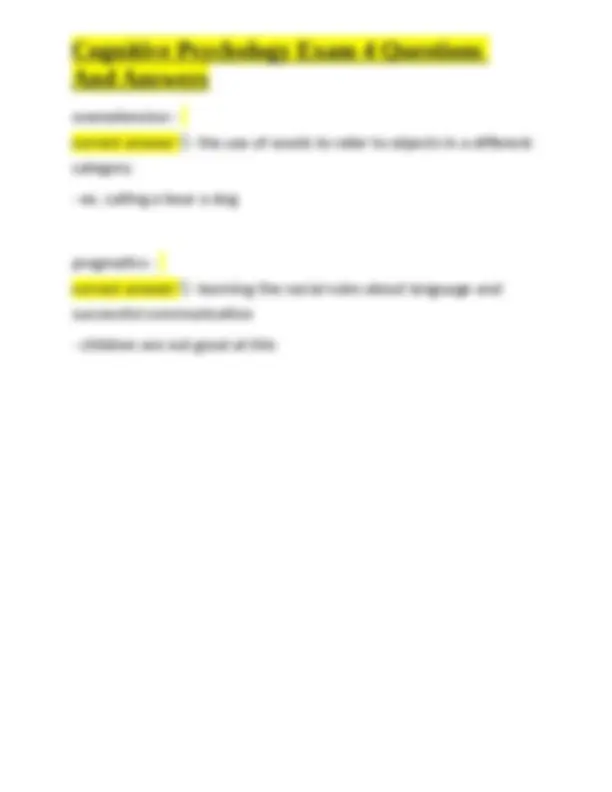Download Cognitive Psychology Exam 4 Questions And Answers and more Exams Cognitive Psychology in PDF only on Docsity!
And Answers
3 components of any problem - correct answer ✅- initial state
- goal state
- obstacles you must overcome to get to the goal state problem representation - correct answer ✅- translating the elements of a problem into a different format
- ex. algebra word problems (taking words and transforming into symbols)
- relies on working memory capacity matrix - correct answer ✅- a grid that shows all possible combinations of items
- most useful for complex stable categorical information algorithm - correct answer ✅- always produces a solution
- sometimes its inefficient because it uses an exhaustive search which tries all possible answers
And Answers
search space - correct answer ✅- all possible solutions problem space - correct answer ✅- number of solutions examined
- used when using a heuristic arrangement problems - correct answer ✅- anagrams (rearrange letters and words) heuristic - correct answer ✅- general rule
- a strategy in which you ignore some alternatives and only explore those alternatives that seem likely to produce a solution the analogy approach - correct answer ✅- using a solution similar to an earlier problem to help in solving a new problem
And Answers
factors that influence problem solving: top-down processing - correct answer ✅- emphasizes concepts, expectations, memory, and prior knowledge factors that influence problem solving: expertise - correct answer ✅- exceptional skill and performance on tasks in a particular area mental set - correct answer ✅- using the same solution from previous problems even when the problem could be solved by different, easier methods
- ex. Leutsen's water jar problem fixed mindset - correct answer ✅- the belief that you possess a certain amount of intelligence or other skills
- people with this mindset believe that effort does not help
And Answers
growth mindset - correct answer ✅- belief that intelligence can be cultivated along with other skills (effort does help) functional fixedness - correct answer ✅- assigns stable uses to an object
- a failure in thinking about the features of the object that might be useful in helping to solve a problem
- due to overactive top down processing
- ex. candle problem gender stereotypes - correct answer ✅- beliefs and opinions associated with females and males
- generally not supported when it comes to problem solving skills stereotype threat - correct answer ✅- if you belong to a group that is hampered by a negative stereotype and you think about your membership in that group, your performance may suffer
And Answers
base rate fallacy - correct answer ✅- emphasizes representativeness and under emphasizes important information about base rates conjunction rule - correct answer ✅- the probability of the conjunction of two events cannot be larger than the probability of either of its single events
- mathematically impossible conjunction fallacy - correct answer ✅- when people judge the probability of the conjunction of two events to be greater than the probability of a single event
- problem - tend to judge using representativeness rather than statistical probability availability heuristic - correct answer ✅- judging the probability of whether an event will occur based on the ease at which examples can be recalled
- only accurate when availability is correlated with true frequency
- can be distorted by recency and familiarity
And Answers
illusory correlation - correct answer ✅- people believe that two variables are statistically related even when there is no evidence of this relationship
- ex. stereotypes framing effect - correct answer ✅- outcome of the decision can be influenced by 1) the background context and 2) the way in which the question is worded prospect theory - correct answer ✅- goes with framing effect
- the tendency to think that possible gains are different from possible loss
- ex. lives saved vs lives lost overconfidence - correct answer ✅- confidence judgments are higher that they should be based on actual performance
And Answers
children's working memory - correct answer ✅- memory spans improve dramatically during childhood
- use the three same working memory components that adults have
- working memory is related to school performance infant amnesia - correct answer ✅- people seldom recall events that happened when they were younger than three years old
- explanations: lack of a life narrative and lack of self identity source monitoring - correct answer ✅- distinguishing between reality and fantasy
- difficult for children under 7 years old and very difficult for preschoolers utilization deficiency - correct answer ✅- not using memory strategies effectively rehearsal - correct answer ✅- not effective
And Answers
- 4-5 year olds do not spontaneously use rehearsal organizational strategies - correct answer ✅- used for grouping and categorization
- younger children do not do this spontaneously imagery - correct answer ✅- 6 year olds can be trained to use imagery effectively, however, the spontaneous use of imagery does not emerge until adolescence long term memory in elderly people - correct answer ✅- they perform semantic and automatic tasks well
- they perform well on implicit memory tasks
- recognition memory stays stable
- age differences are found for prospective memory and we see substantial age differences for explicit memory early language production - correct answer ✅- 2 months: cooing
- 6 months: babbling
And Answers
overextension - correct answer ✅- the use of words to refer to objects in a different category
- ex. calling a bear a dog pragmatics - correct answer ✅- learning the social rules about language and successful communication
- children are not good at this

